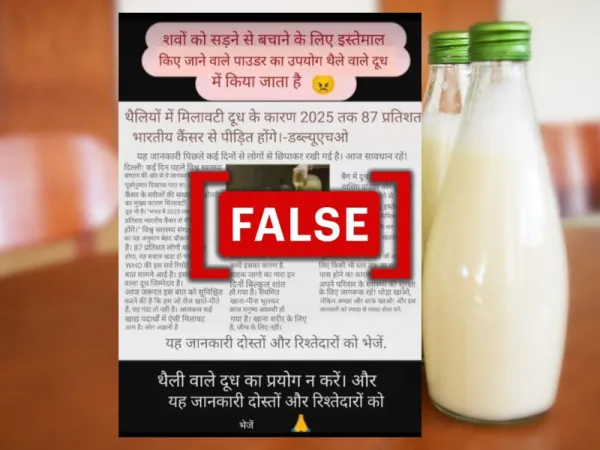By: Nabeela Khan
February 20 2024
No, WHO hasn't issued this advisory against packaged milk

A newspaper clip doing the rounds on WhatsApp claims that the WHO has issued an advisory against the consumption of packaged milk. (Source: WhatsApp)
The Verdict False
WHO has neither issued any advisory nor has it published any report that links consumption of packaged milk with cancer.
What's the claim?
A screenshot of a purported newspaper clip stating that the World Health Organization (WHO) has issued an advisory to the Government of India suggesting that 87 percent of the population will suffer from cancer by 2025 because of consuming contaminated milk is doing the rounds.
The screenshot adds that packaged milk contains a certain powder that is harmful. It further highlights that this information has been hidden from the public for the last few days and that one should be careful.
What's the truth?
We examined the screenshot and found the font size of the first and the second line of the message to be different. Further, the size of the text changes throughout the story and the text alignment is inconsistent.
Screenshot of the Whatsapp message highlighting discrepancies (Source: WhatsApp)
There is also no news report that states that 87 percent of the population will suffer from cancer by 2025. In an email reponse to Logically Facts, WHO confirmed that they have not issued any such advisory. They further shared country-specific data on cancer and the latest data set under the projected cancer cases is for 2045, not 2025.
WHO has, however, issued a clarification stating, "Contrary to reports in a section of media, WHO would like to state that it has not issued any advisory to the Government of India on the issue of adulteration of milk/milk products.” The document did not mention the date it was uploaded, but we found it was created in November 2020.
Statement from WHO confirming that no advisory on adulteration of milk has been issued. (Source: WHO)
In January 2023, the Ministry of Fisheries, Animal Husbandry, and Dairying, in a press statement dated January 19, 2023, stated, “A media report about a WHO advisory to the Government of India allegedly states that, if adulteration of milk and milk products is not checked immediately, 87 percent of citizen would be suffering from serious disease like cancer by the year 2025. Dissemination of this kind of false information creates unnecessary panic among consumers”. It reiterated that this kind of false information circulated on social media and WhatsApp should not be given any credence.
A statement from the ministry clarifying that WHO has not issued any advisory. (Source:PIB)
Is your milk safe?
According to the Food Safety and Standards Authority of India’s (FSSAI) 2019 survey on milk quality, “Above 93 percent of the samples, that is 5,976 out of 6,432 samples, were found to be absolutely safe for human consumption.”
Only 12 out of 6,432 milk samples were adulterated, rendering such milk unsafe for human consumption. “While there is a concern, this dispels the widespread perception that liquid milk in the country is largely adulterated,” the report added.
In 2022, FSSAI conducted a milk survey in 12 states, of which 10 had an incidence of Lumpy Skin Disease (LSD). The study's result stated that the milk sold in the selected 12 states is mainly safe for consumption.
Moreover, there is not enough good evidence to prove that milk and dairy can cause cancer according to Cancer Research UK.
The verdict
WHO did not issue any advisory to the Government of India about milk adulteration or publish any data linking adulterated milk consumption with cancer.


